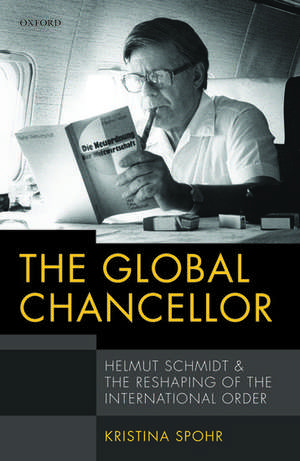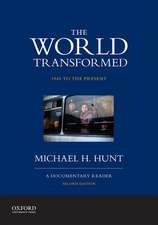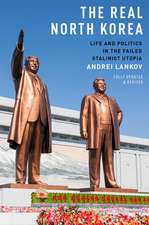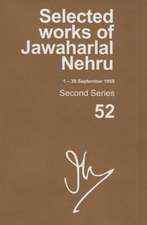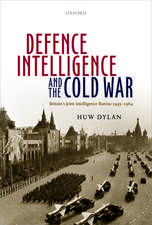The Global Chancellor: Helmut Schmidt and the Reshaping of the International Order
Autor Kristina Spohren Limba Engleză Hardback – 24 mar 2016
Preț: 370.62 lei
Preț vechi: 432.40 lei
-14% Nou
Puncte Express: 556
Preț estimativ în valută:
70.92€ • 74.24$ • 58.68£
70.92€ • 74.24$ • 58.68£
Carte tipărită la comandă
Livrare economică 26 martie-01 aprilie
Preluare comenzi: 021 569.72.76
Specificații
ISBN-13: 9780198747796
ISBN-10: 0198747799
Pagini: 228
Ilustrații: 17 black and white images
Dimensiuni: 177 x 241 x 21 mm
Greutate: 0.49 kg
Editura: OUP OXFORD
Colecția OUP Oxford
Locul publicării:Oxford, United Kingdom
ISBN-10: 0198747799
Pagini: 228
Ilustrații: 17 black and white images
Dimensiuni: 177 x 241 x 21 mm
Greutate: 0.49 kg
Editura: OUP OXFORD
Colecția OUP Oxford
Locul publicării:Oxford, United Kingdom
Recenzii
The Global Chancellor is a very useful in-depth study which contextualizes West German diplomacy and initiatives within the international developments of the 1970s and early 1980s and constitutes an authoritative work on the chancellorship of Helmut Schmidt.
[T]here is a refreshing quality to Spohr's narrative. Hers is a book peopled with recognizable and well-drawn individual characters.
a remarkable contribution on one of the key figures of the second half of the 20th century
Kristina Spohr's excellent new book ... makes a convincing case for [Schmidt's] important role in global affairs. She has succeeded in establishing the terms of future scholarly debate on his historical significance.
The Global Chancellor is more than a first rate biography; it is a seminal account of fundamental change in the international system during the 1970s. It should be read by everyone who tries to understand how today's world was created.
The strength of the book is the way it illuminates Schmidt's thinking on both economic and strategic questions and the relationship between them.
[Spohr] has done readers a service by crafting a well-documented English-language treatment of this leading twentieth-century statesman.
In this book Kristina Spohr offers a major and long overdue reassessment of German Chancellor Helmut Schmidt ... a major contribution by a first-rate scholar and should be widely read. It is testament to the importance and value of detailed archival research.
In her fine new study, Kristina Spohr makes the case for re-evaluating Schmidt's role in international politics ... Spohr has written an excellent brief account of Schmidt's role in Western councils during the 1970s and early 1980s. In doing so, she has gone a long way towards rehabilitating his role as a statesman as well.
[An] exceedingly fine and sophisticated study Professor Spohr's thoughtful and cogently argued reassessment of Schmidt raises profound questions about the role of individuals in international politics in general as well as about Schmidt's posthumous standing The Global Chancellor is a little gem; it is international history at its best. It leaves one asking for more, and perhaps Professor Spohr can be induced to turn her hand to Schmidt's relations with France, Poland and China, the rise of the latter in the twenty-first century he predicted before it became fashionable to do so.
Spohr deftly designs a political history that goes beyond the ordinary political biography, engaging the reader to reevaluate the complex (and now often forgotten) times when Schmidt served and his ability to manage many unknowns ... Highly recommended.
This is truly novel: Helmut Schmidt consistently explored in an international perspective rather than from an inward-looking German viewpoint -- this is real progress not only for our understanding of the person, but of the whole history of the Federal Republic.
Kristina Spohr's brilliant analysis succeeds thanks to its global view of Helmut Schmidt -- one that is rarely found in Germany. This book is the first to illuminate him in terms of his full significance for world politics. A must for anybody interested in contemporary history.
A pioneering study which reveals Schmidt's unusual personal impact on the growth of West Germany's international significance during a time of great crises. It is based on the widest array of sources and couched in appealing biographical form. Those who want to understand how Germany returned to the realm of world politics will find in Spohr's book important cornerstones of an explanation.
seldomly has a historical study been so current as Kristina Spohr's book on Helmut Schmidt.
a must read
[T]here is a refreshing quality to Spohr's narrative. Hers is a book peopled with recognizable and well-drawn individual characters.
a remarkable contribution on one of the key figures of the second half of the 20th century
Kristina Spohr's excellent new book ... makes a convincing case for [Schmidt's] important role in global affairs. She has succeeded in establishing the terms of future scholarly debate on his historical significance.
The Global Chancellor is more than a first rate biography; it is a seminal account of fundamental change in the international system during the 1970s. It should be read by everyone who tries to understand how today's world was created.
The strength of the book is the way it illuminates Schmidt's thinking on both economic and strategic questions and the relationship between them.
[Spohr] has done readers a service by crafting a well-documented English-language treatment of this leading twentieth-century statesman.
In this book Kristina Spohr offers a major and long overdue reassessment of German Chancellor Helmut Schmidt ... a major contribution by a first-rate scholar and should be widely read. It is testament to the importance and value of detailed archival research.
In her fine new study, Kristina Spohr makes the case for re-evaluating Schmidt's role in international politics ... Spohr has written an excellent brief account of Schmidt's role in Western councils during the 1970s and early 1980s. In doing so, she has gone a long way towards rehabilitating his role as a statesman as well.
[An] exceedingly fine and sophisticated study Professor Spohr's thoughtful and cogently argued reassessment of Schmidt raises profound questions about the role of individuals in international politics in general as well as about Schmidt's posthumous standing The Global Chancellor is a little gem; it is international history at its best. It leaves one asking for more, and perhaps Professor Spohr can be induced to turn her hand to Schmidt's relations with France, Poland and China, the rise of the latter in the twenty-first century he predicted before it became fashionable to do so.
Spohr deftly designs a political history that goes beyond the ordinary political biography, engaging the reader to reevaluate the complex (and now often forgotten) times when Schmidt served and his ability to manage many unknowns ... Highly recommended.
This is truly novel: Helmut Schmidt consistently explored in an international perspective rather than from an inward-looking German viewpoint -- this is real progress not only for our understanding of the person, but of the whole history of the Federal Republic.
Kristina Spohr's brilliant analysis succeeds thanks to its global view of Helmut Schmidt -- one that is rarely found in Germany. This book is the first to illuminate him in terms of his full significance for world politics. A must for anybody interested in contemporary history.
A pioneering study which reveals Schmidt's unusual personal impact on the growth of West Germany's international significance during a time of great crises. It is based on the widest array of sources and couched in appealing biographical form. Those who want to understand how Germany returned to the realm of world politics will find in Spohr's book important cornerstones of an explanation.
seldomly has a historical study been so current as Kristina Spohr's book on Helmut Schmidt.
a must read
Notă biografică
Kristina Spohr is Associate Professor of International History at the London School of Economics. German-Finnish by birth, she studied at the University of East Anglia, Sciences Po Paris, and Cambridge University and also worked for a year in the NATO Secretary General's Private Office in Brussels. Her publications include Germany and the Baltic Question after the Cold War: The Development of a New Ostpolitik, 1989-2000 (2004); Building Sustainable and Effective Capabilities: A Systemic Comparison of Professional and Conscript Forces (editor, 2004); and At the Crossroads of Past and Present: 'Contemporary' History and the Historical Discipline (co-editor, 2011).
